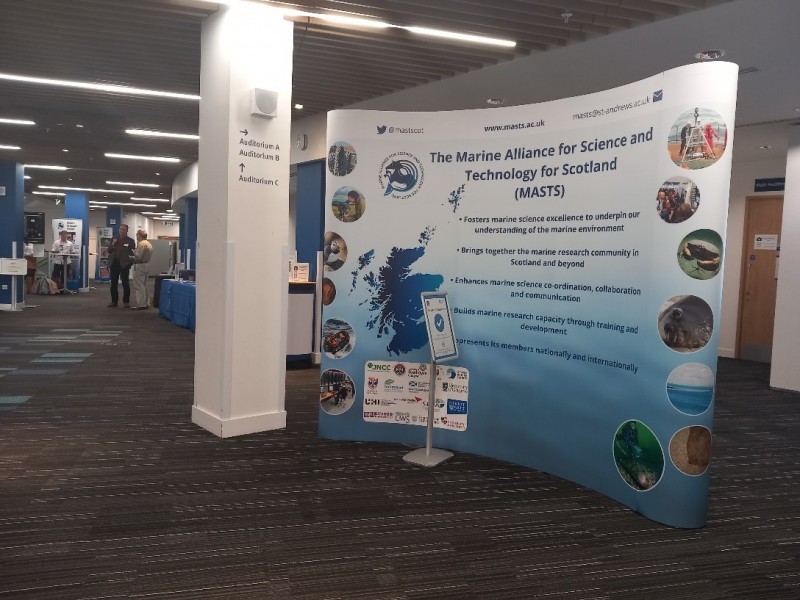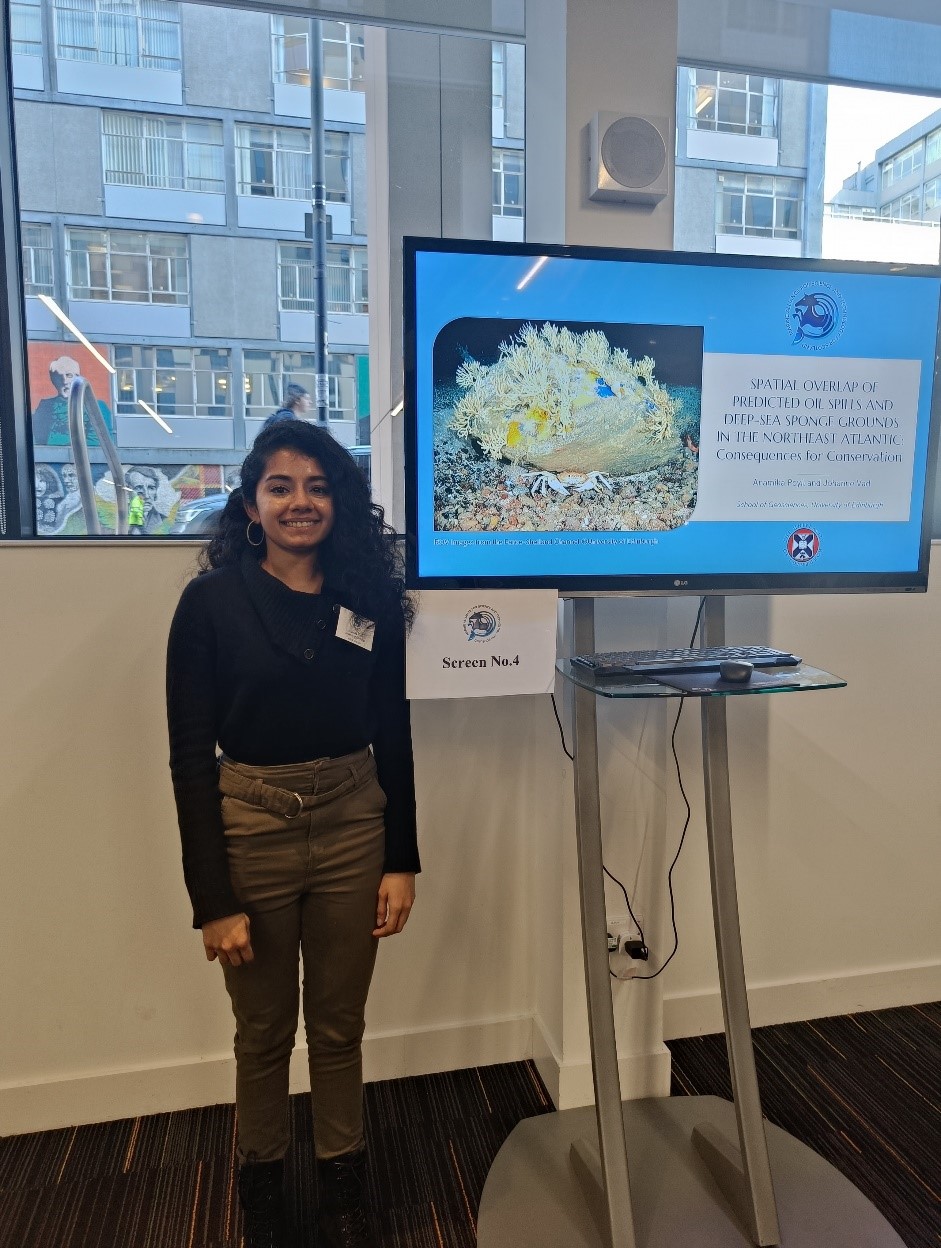Marine Alliance for Science and Technology Scotland Annual Science Meeting, 2022
Anamika Poyil
University of Edinburgh

Caption: The MASTS 12th ASM venue at the Technology & Innovation Centre, University of Strathclyde, Glasgow.
I am extremely grateful to the Challenger Society for awarding me a travel grant to participate in the 12th Marine Alliance for Science and Technology Scotland (MASTS) Annual Science Meeting (ASM) from 8-10 November 2022, held in Glasgow at the University of Strathclyde. Since the previous ASMs for the last two years were online, attending the conference in person was a welcome relief. This was also my first time presenting my research as an e-poster. The twelfth MASTS ASM aimed to promote and disseminate marine science research on how to support the Blue Economy Vision for Scotland. I enjoyed attending the ASM because I was able to listen to expert plenaries and talk sessions discussing marine science research and management practices in view of global climate change. I spent Day One mostly attending sessions, looking at the exhibits and e-posters and networking with peers, researchers and academics interested in ecological modelling. There were several engaging talks on the latest innovations in integrating science and policy to address Scotland’s Blue Economy Vision and modelling studies concerning climate change and species dispersal.
On Day Two, I presented my research in the e-poster session alongside a few classmates from my master’s programme. My research examined the spatial overlap between a broad-scale ensemble species distribution model (SDM) produced for deep-sea sponges in the Northeast Atlantic and Nordic regions and already available modelled oil spills at the depths of 10-450 metres, 500-950 metres and 1000-1500 metres in the Faroe-Shetland Channel. The ensemble model was estimated as the weighted average of three SDMs fitted to deep-sea sponge occurrence records obtained from the International Council for the Exploration of the Sea Data Portal using Maximum Entropy, Generalized Additive Model, and Random Forest algorithms using the programming language R and QGIS. The e-poster displayed a succinct version of my research, explaining the overview of the approach, the predicted sponge habitats in the study area using the SDMs, the visualisation of the spatial overlap between the ensemble model and oil spill models, and recommendations on how the research can assist future deep-sea surveys, environmental impact assessments and marine spatial planning. It was an enriching experience to talk to people of different backgrounds, from academia to industry stakeholders, about my research and discuss future opportunities and developments in the field of deep-sea ecological modelling.

Caption: Presenting the e-poster of my master’s dissertation research on Day 2 of the MASTS ASM.
The final day involved workshops and training sessions, and I attended the “10th Anniversary Special of the Salvage, Decommissioning & Wreck Removal Workshop” organised by the Society for Underwater Technology, MASTS, and the D’Arcy Thomson Forum. The highlight of the workshop was the session on the exploration and removal of wrecks, with a presentation that took the audience all the way down to the Titanic and its current purpose of serving as an artificial reef for an array of marine communities on the ocean floor of the North Atlantic. I greatly appreciate the Challenger Society’s generous assistance in enabling my participation at the MASTS ASM, and I look forward to the next ASM in 2023.
Profile
I have a master’s degree (MSc Marine Systems and Policies) from the University of Edinburgh, and my dissertation focussed on analysing the spatial overlap of oil spill models in the Faroe-Shetland Channel and the ensemble species distribution model of deep-sea sponges in the Northeast Atlantic and Nordic regions. I am currently working as a GIS officer for the Scottish East Coast Review (SEaCoR) Project, collaborating with Project Officers in GIS analysis and mapping for its digital report to illustrate the sustainability of the East Coast of Scotland using state, pressure, and impact indicators.
Latest News
Marine Data Management, Governance and the MEDIN toolset
The Marine Environmental Data and Information Network (MEDIN) and OceanWise are delighted to invite you to attend our popular free online training workshop: ‘Marine Data Management, Governance and the MEDIN toolset’ on the 19th – 23rd of May 2025.
Workshop on the contribution of UK Arctic Ocean science to the International Polar Year 32/33
12:00 11th June – 16:00 12th June 2025: NOC Southampton (In-person with online option): Registration deadline 16th May
REGISTER HERE
Pre-meeting questionnaire (open to all)
The purpose of this workshop is for the UK Ocean Science community to discuss and then draft a prospectus document outlining the priority Arctic research questions the community would like to address during the run up to, throughout and beyond the International Polar Year 32/33. Additionally, to identify what unique strengths and technologies the UK has to help fill these knowledge gaps.
The second day of the workshop will be dedicated to writing groups, one for each of the priority research questions identified - from both the pre-meeting questionnaire (HERE) and day one discussion. By the end of the meeting, each group will have produced draft text and sourced supporting figures for the prospectus.
Post meeting, the draft will be opened for comments and suggestions from everyone, regardless of whether they were able to attend the workshop or not. It will then be shared with UK funders (UKRI, FCDO, DSIT, ARIA) and potential international programmes with whom we would like to collaborate (e.g. Arctic 2050, Norway). It will form a basis from which wider integration with terrestrial, atmospheric and cryosphere communities can be built, e.g. at the UK Arctic Science Meeting in September in Northumbria.
To ensure balanced community and ECR representation, and to ensure that the size of the writing groups is efficient and effective, if the number of registrations from individual institutes becomes overwhelming, we may contact individuals or teams and ask that each institute selects a smaller number of individuals to attend in-person. Please wait for confirmation of in-person attendance before finalising travel arrangements.
The workshop will be open to hybrid attendance and contributions on both days.
Challenger Society Council Position Vacancy
The Challenger Society for Marine Science (CSMS) are pleased to announce an exciting opportunity to support the next generation of ocean scientists and innovators. CSMS are looking for a new Council member to fill the Student Travel Awards and Stepping Stones Portfolio. The successful applicant will administer the travel and research grants available for Early Career Researchers.
The role involves:
- Receiving applications for the two schemes and responding to applicant inquiries
- Soliciting and compiling input from the rest of the Council for assessing the applications
- Communicating with successful and unsuccessful applicants for the two schemes
- Working with the Honorary Treasurer on allocating funds to successful applicants
- Following up with award winners on their reporting requirements
- Attending Council meetings four times a year (in person or online) and contributing to discussions and decision making for CSMS
The usual term for Council members is three years.
For more information about the CSMS Council, please follow this link: https://www.challenger-society.org.uk/The_Council
For more information about our Early Career Researcher grants and awards, please follow this link:
https://www.challenger-society.org.uk/Stepping_Stones
and
https://www.challenger-society.org.uk/Travel_awards
If you are interested in applying or have any questions regarding the role, please contact kathen@bas.ac.uk
